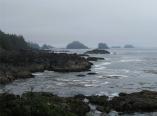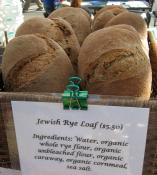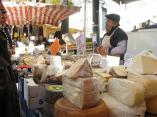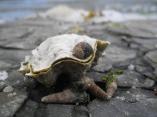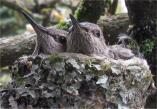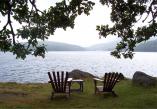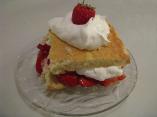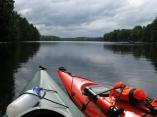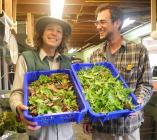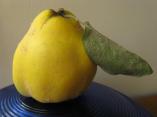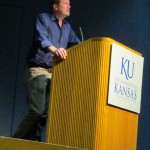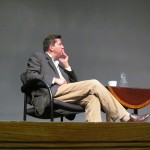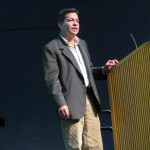I managed to get a long overdue poetry reading into my ASLE week, attending the plenary reading by Maine poet Jeffrey Thomson and Colombian writer Juan Carlos Galeano, who teaches in Florida. I had first encountered Galeano at my first ASLE at UVic in 2009, where he read some of his translated poems from Amazonia, a charming collection that draws its inspiration from Amazonian folk tales. This time he read from that, accompanied by projected translations, as well as from a new work just published (in Spanish) in Peru, Special Report on the Wind. Thomson read from several works, notably his 2009 collection Birdwatching in Wartime; his anecdote about hanging back while the sounds of a group of students he was with faded and observing the way the forest animated after the humans had left stayed with me as a good metaphor for what a lot of presentations touched on.
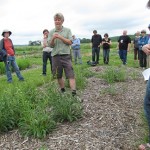 The Friday afternoon field trip I chose was a trip to the Native Medicinal Plant Research garden, which also houses the university’s community gardens. We were led down the garden path by the excellent Kelly Kindscher, a highly knowledgeable prairie ethnobotanist and wetlands advocate, who explained a bit about the program and let us pick, crush, sniff and ponder over many of the garden’s plants. The program’s main aim is to examine native plants for cancer-healing and antioxidant properties, and Kindscher made some interesting observations about the narrowness of that kind of research: what else might we be missing by focusing on molecules? As if to prove the point I caught myself asking which part of the immune-boosting Topeka Purple Coneflower (echinacea atrorubens) was used for tea. How locked we all are in our modes of thinking: had I not just heard Karin Kilpatrick say that one Western medicine’s many mistakes is failing to use the entire plant as native cultures do? Below, we look at Rattlesnake Master (Eryngium yuccifolium), Kelly demonstrates the invasive power of Milkweed (Asclepias syriaca. a good food – if cooked) ironically invading a patch of mint; and the star plant of the moment, the Long-Leafed Ground Cherry (Physalis longifolia) which is showing some powerful antioxidant properties, offering 14 new compounds that reduce tumour size in breast and pancreatic cancer.
The Friday afternoon field trip I chose was a trip to the Native Medicinal Plant Research garden, which also houses the university’s community gardens. We were led down the garden path by the excellent Kelly Kindscher, a highly knowledgeable prairie ethnobotanist and wetlands advocate, who explained a bit about the program and let us pick, crush, sniff and ponder over many of the garden’s plants. The program’s main aim is to examine native plants for cancer-healing and antioxidant properties, and Kindscher made some interesting observations about the narrowness of that kind of research: what else might we be missing by focusing on molecules? As if to prove the point I caught myself asking which part of the immune-boosting Topeka Purple Coneflower (echinacea atrorubens) was used for tea. How locked we all are in our modes of thinking: had I not just heard Karin Kilpatrick say that one Western medicine’s many mistakes is failing to use the entire plant as native cultures do? Below, we look at Rattlesnake Master (Eryngium yuccifolium), Kelly demonstrates the invasive power of Milkweed (Asclepias syriaca. a good food – if cooked) ironically invading a patch of mint; and the star plant of the moment, the Long-Leafed Ground Cherry (Physalis longifolia) which is showing some powerful antioxidant properties, offering 14 new compounds that reduce tumour size in breast and pancreatic cancer.
Finally, my day came first thing on Saturday morning when I read my personal essay in the company of two quite different academic papers. I had not expected more than a couple of people to attend, since it was 8:30 in the morning and the room was murderously difficult to find, but we had a healthy gathering of 15 or so which was gratifying, and the discussion was interesting and friendly. The sessions I went to in the Species & Food subject stream were all pretty well attended; I understand it was the first time ASLE had had a food theme, so I expect it will continue. Since I have the floor, here is the panel in its entirety: Shamim Us-Saher Ansari, St. Louis Community College-Meramec: ‘You are What You Eat and How You Eat’: The Ethics and Aesthetics of Eating in French Canadian Culture as Dramatized in Willa Cather’s Shadows on the Rock; Bethany Ober, Penn State University: Expanding the Limits of Gender and Domesticity in Contemporary Ecofeminist Memoir; and Rhona McAdam, In your own backyard: Food sovereignty & the urban garden.
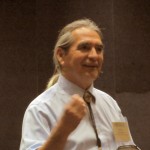 After that there was only time for one more session before I had to leave for the airport, and fortunately for me it was Daniel Wildcat. The title of his topic, After progress: Enacting systems of life-enhancement frankly put me off but I went anyway and was very glad I did, as he was an entertaining and persuasive speaker. Describing himself as a recovering academic, he spoke about how to respond to a damaged world, using “indigenous realism.” This is not, he stressed, naive romanticism: that label is better represented by the idea that humans are in charge of the balance of life on the planet. What we need, he said, is a cultural climate change, one that bridges the gap from knowing to doing and does not include a division between nature and culture. Storytelling is lost: the stories our children hear now are not the wisdom transmitted by their elders, but 30 second soundbites developed by corporations in order to teach kids to be consumers. We need to get from a sense of inalienable rights to one of inalienable responsibility, in a world of relationships not resources. The least each of us can do, if we can’t fix the planet, is to become a better relative and make the world a better place for nonhuman relatives.
After that there was only time for one more session before I had to leave for the airport, and fortunately for me it was Daniel Wildcat. The title of his topic, After progress: Enacting systems of life-enhancement frankly put me off but I went anyway and was very glad I did, as he was an entertaining and persuasive speaker. Describing himself as a recovering academic, he spoke about how to respond to a damaged world, using “indigenous realism.” This is not, he stressed, naive romanticism: that label is better represented by the idea that humans are in charge of the balance of life on the planet. What we need, he said, is a cultural climate change, one that bridges the gap from knowing to doing and does not include a division between nature and culture. Storytelling is lost: the stories our children hear now are not the wisdom transmitted by their elders, but 30 second soundbites developed by corporations in order to teach kids to be consumers. We need to get from a sense of inalienable rights to one of inalienable responsibility, in a world of relationships not resources. The least each of us can do, if we can’t fix the planet, is to become a better relative and make the world a better place for nonhuman relatives.
